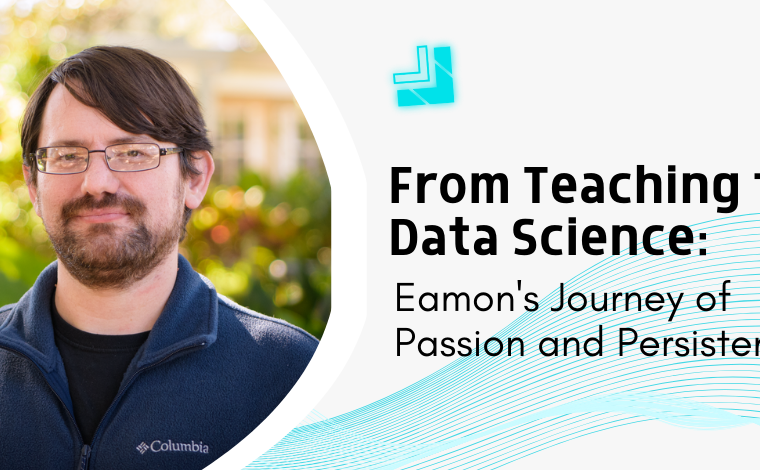Data Science For Dummies

Stay Informed With Our Weekly Newsletter
Receive crucial updates on the ever-evolving landscape of technology and innovation.
Looking to get a handle on data science basics?
Look no further.
In today’s digital era, data science stands out as a popular career choice, and for good reason.
With businesses and organisations churning out heaps of data, there’s a booming demand for data scientists.
The global data science platform market, valued at a staggering USD 95.31 billion in 2021, is forecasted to grow at a compound annual growth rate (CAGR) of 27.6% in the coming years.
This surge is fueled by advancements in technologies like edge computing, streaming analytics, the Internet of Things (IoT), and Artificial Intelligence (AI).
If you’re new to the world of data science, this guide, data science for dummies, gives those of us with a novice understanding of data science, valuable insights on how to become a data scientist in 2024.
Data science for dummies: Understanding the role of data scientist

Before diving into this guide; data science for dummies, it’s essential to understand the role and responsibilities associated with this profession.
A data scientist is an expert who uses scientific methods, algorithms, and statistical techniques to extract valuable insights from vast amounts of data.
Their objective is to help organisations make data-driven decisions and solve complex problems.
But this is data science for beginners, so what does a typical day in the life of a data scientist look like? Let’s delve into the key responsibilities and skills required for this exciting career.
Key responsibilities of a data scientist
As a data scientist, you will be responsible for various tasks throughout the data science lifecycle.
You will need to collect and clean data, perform exploratory data analysis, build predictive models, and communicate the results to stakeholders.
But it doesn’t stop there. A data scientist also plays a crucial role in identifying patterns, trends, and correlations within the data, helping organisations gain a competitive edge.
Moreover, data scientists are often involved in designing and implementing data-driven strategies, collaborating with cross-functional teams to ensure that data insights are effectively integrated into business operations.
This requires excellent communication and presentation skills, as you will need to convey complex technical concepts to non-technical stakeholders clearly and concisely.
Skills required for a data scientist
Data science for beginners requires a combination of technical and non-technical skills is required.
Firstly, you should have a strong foundation in mathematics and statistics. Understanding concepts such as probability, linear algebra, and statistical inference will be crucial in your data analysis journey.
These mathematical principles form the backbone of many data science algorithms and models.
Additionally, proficiency in programming languages, such as Python or R, is essential for data manipulation, visualisation, and modelling. Being able to write efficient and scalable code will enable you to process and analyse large datasets effectively.
Furthermore, data scientists must have a deep understanding of machine learning and artificial intelligence algorithms. These algorithms empower data scientists to develop models that can predict future outcomes or classify data accurately.
Moreover, knowledge of data warehousing, data mining, and data visualisation tools will give you an edge in your data science career.
Familiarity with tools like SQL, Hadoop, and Tableau will enable you to extract, transform, and visualise data efficiently, making it easier for stakeholders to understand and interpret the insights you provide.
The educational path to data science

While the road to becoming a data scientist is diverse, certain educational paths can help you acquire the necessary knowledge and skills.
Pursuing a relevant degree is often seen as a valuable foundation for a career in data science.
Relevant degree subjects for data science
If you want to specialise in data science, degrees in computer science, mathematics, statistics, or a related field will prove beneficial.
These degrees provide fundamental knowledge in areas such as programming, data analysis, and mathematical modelling.
Importance of postgraduate studies in data science
While an undergraduate degree can provide a solid foundation, postgraduate studies offer the opportunity to delve deeper into the field of data science.
Many universities now offer dedicated master’s programs in data science or related disciplines.
These programs provide advanced coursework and hands-on experience in data analysis, machine learning, and big data technologies. Postgraduate studies can significantly enhance your technical skills and make you more competitive in the job market.
You can also explore accredited programs like those offered by the Institute of Data, which provide skills training and practical experience.
Essential technical skills for a data scientist
Technical skills are at the core of a data scientist’s toolkit. Alongside a deep understanding of statistics and mathematics, proficiency in various programming languages and tools is vital.
Proficiency in programming languages
A data scientist should be fluent in at least one programming language, such as Python or R.
Python is widely used in data analysis and has an extensive library ecosystem, including popular data science libraries such as Pandas and NumPy. R, on the other hand, is known for its statistical capabilities and is commonly used in academic research.
Understanding of machine learning and artificial intelligence
Data scientists must possess comprehensive knowledge and practical experience in various machine-learning algorithms and techniques.
From supervised learning methods such as linear regression and support vector machines to unsupervised techniques like clustering and dimensionality reduction, understanding the different machine learning paradigms is essential when it comes to data science for dummies.
The importance of statistical knowledge

Statistical knowledge underpins the practice of data science. It enables data scientists to draw meaningful conclusions from data and make informed decisions.
Role of statistics in data science
Statistics provides data scientists with a framework for making sense of data. By applying statistical concepts such as hypothesis testing and confidence intervals, data scientists can identify patterns, evaluate models, and validate their findings.
Statistical tools and techniques in data science
Data scientists rely on statistical software packages like SAS, SPSS, or R to perform statistical analysis. These tools offer a wide range of statistical techniques, from basic descriptive statistics to advanced regression models and time series analysis.
Soft skills for succeeding in data science
While technical skills are paramount, developing soft skills is equally important when it comes to data science for beginners.
Communication skills for data scientists
Data scientists need to effectively communicate their findings and insights to stakeholders who may not have a technical background.
Clear and concise communication plays a vital role in bridging the gap between data analysis and decision-making. Being able to explain complex concepts in simple terms is crucial for data scientists, and it’s important to note when studying data science for beginners.
Problem-solving and critical thinking in data science
When discussing data science for beginners, it’s essential to note that data scientists are problem solvers at heart.
They must possess strong critical thinking skills to identify appropriate data analysis techniques, find innovative solutions to complex problems, and evaluate the strengths and weaknesses of different approaches.
Strong problem-solving abilities allow data scientists to deliver actionable insights that drive business growth.
Conclusion
We hope this guide on data science for beginners has helped you gain a deeper understanding of this dynamic field. Becoming a data scientist requires a combination of technical expertise, statistical knowledge, and soft skills.
By understanding the role of a data scientist, investing in the right education, acquiring essential technical skills, and developing strong problem-solving and communication abilities, you can embark on a rewarding career journey in the field of data science.
Learn more about data science for beginners by exploring the Institute of Data’s comprehensive Data Science & AI program.
Alternatively, we invite you to schedule a complimentary career consultation with a member of our team to discuss data science for beginners in more detail.




